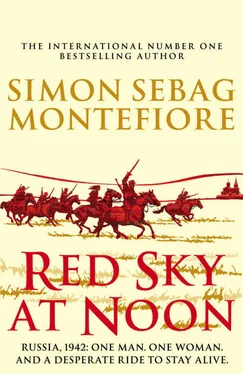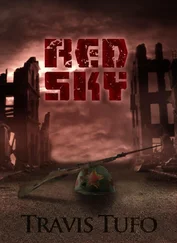‘Colonel von Schwerin?’ said the Chief of Staff Generaloberst Halder. Schwerin noticed the two Iron Crosses won in the Great War.
Schwerin coughed a little self-consciously. ‘I’m here.’ The air was sweltering in the hut.
‘Welcome to Führerhauptquartier Werwolf, Colonel von Schwerin,’ said Halder. ‘Step forward next to Generaloberst von Weichs…’
The wall of backs in field grey opened up for him. Keitel and Jodl gave him a brisk nod, and the bespectacled Weichs, commander of Army Group B, his ultimate superior, shook his hand and made space on his right around the map table.
The new arrival saluted. ‘Mein Führer, Colonel von Schwerin, Intelligence, Sixth Army, reporting.’
Across the table, Hitler was leaning forwards on his elbows. He was wearing a sandy-coloured double-breasted jacket with a dark tie, his Iron Cross was on his chest, and a scarlet swastika band was on his right arm.
‘Welcome, colonel,’ said Hitler. ‘Your flight to Vinnitsa was easy, I hope?’
‘Very quick, mein Führer. General Paulus sends his regards.’
Hitler nodded. ‘What have you got for us?’
‘Tactical plans for this sector from Soviet headquarters that I believe may impact on Operation Fischreiher. Hence I’ve rushed them here as soon as I had analysed them.’
There was a beat of silence.
‘First of all, how reliable is the provenance?’ asked Halder, who was next to Hitler. ‘Have they been missed?’
‘The documents belonged to a Soviet staff officer killed when our planes strafed his car. Kapto, a medical officer in a penal battalion, attended the scene and procured the documents which the Soviet General Staff believed were destroyed in the fire. Kapto, a long-standing anti-Soviet agitator, then defected to our side. He was a childhood friend of another defector and anti-Soviet agitator Mandryka, who set up a Schuma auxiliary police unit. This Kapto had been serving a sentence for anti-Soviet agitation in the Kolyma Camps. This is the first factor that encourages us to treat this material as legitimate. Kapto was interviewed by my colleague Captain von Manteuffel, who made the first inspection of the materials and was convinced of their importance and authenticity. Sadly, yesterday partisans attacked and killed them.’
‘But they left the maps?’ asked Halder.
‘Yes, Generaloberst.’
‘Why didn’t they take them?’
‘Doesn’t that suggest that they wanted us to have them?’ asked Weichs.
‘I have considered this at length,’ said Schwerin. ‘First the provenance: the anti-Soviet credentials of Mandryka and Kapto are flawless and long-standing, confirmed by other assets. If this was a Soviet intelligence operation, they would never have sent partisans to kill Kapto and my fellow officers as that would have undermined the credibility of the documents. So in my opinion, the attack strengthens the case for believing this is genuine. I also believe personally that the partisan attack was not by Soviet partisans but by Ukrainian nationalist elements at large in the sector who were unaware of the documents and circumstances.’
Hitler was fidgeting, his fingers tapping on the green baize table. Halder held up his hand to signal that this was too much information: could Schwerin hurry up and give his judgement?
‘Yes… yes, my conclusion!’ answered Schwerin. ‘I have consulted with Abwehr colleagues. We conclude these battle plans are authentic and significant.’
Hitler, smiling, impatient, even excited, tapped both forefingers on the table again: ‘Well, colonel, cut to the quick. What do they say?’
Schwerin opened his briefcase and drew out a package of maps, selecting one, which he unfolded. Hitler rested his chin in his right hand as he looked at its arrows and Cryllic lettering.
‘This is a complex series of plans by Soviet headquarters for different scenarios created by the advance of Army Group A in Operation Edelweiss and Army Group B towards Stalingrad in Operation Fischreiher—’ Schwerin continued.
‘Yes, yes,’ interrupted Halder. ‘And you regarded this as of such importance that you wished to tell the Führer yourself.’
‘Yes.’
‘So what’s so important about it?’
‘I am all ears,’ said Hitler, smirking, and the generals laughed.
‘The maps suggest that it is unlikely Stalin ever considered Stalingrad to be in peril—’
‘Well, he’s in for a big surprise then!’ said Hitler. More laughter.
‘If I may continue, mein Führer? These plans suggest that, if we advance on Stalingrad, Stalin will resist vigorously. But only up to a point. He’s learned the lessons of our blitzkrieg. One of these scenarios is for an orderly withdrawal from the city. Rather than bleed his forces and risk encirclement, he may defend a new line that we believe is being prepared to the east. After the encirclements of Kiev and Kharkov, he cannot afford to lose more of his diminishing reserves.’
‘Just one of several scenarios?’ asked Hitler.
‘Yes, mein Führer.’
‘Do any of these plans envisage defending Stalingrad at any cost?’
‘Not specifically. This is the most detailed plan and—’
Halder interrupted him again: ‘That makes no sense, no sense at all. They’re fighting for every inch and I’ve been reading about Stalin’s command of Stalingrad, then called Tsaritsyn, during the Civil War in 1918. Then, as now, he built up vast reserves to throw at our flanks where we are over-committed. The city is the symbol of his name, of his prestige. He will never let it fall! It is we who will be bled, we who risk encirclement. Mein Führer—’
Hitler cut him off hoarsely with a slicing gesture of his hand. ‘As usual, Generaloberst Halder is frightened of ghosts. You vastly overestimate Stalin’s reserves and capabilities. He’s scarcely managed any such complex operations so far. All along I’ve expected the Russians to withdraw behind the Volga and ultimately the Urals. It’s the Russian way: fight with the insane, bestial bravery of the Untermenschen , then headlong retreat and mass surrender. Here you have it, gentlemen. Here’s the proof provided by Colonel von Schwerin and the maps of this man, Kapto. Wasn’t I right in Poland, in France? My instincts were right to divide Army Group South into A and B, and correct now to take Stalingrad at once, whatever the cost. Here are my orders. Move the Fourth Panzer Army, and more air cover and bombers, directly to Army Group B. Generaloberst von Weichs: you are to advance on Stalingrad. It will be ours within four weeks.’
‘I must protest, mein Führer,’ said Halder, face flushed and anxious. ‘I wish to register my view that this is a mistake. A fatal mistake.’
Hitler ignored him. ‘Fine report, Colonel von Schwerin, and while you’re here, enjoy a good meal, a sauna and, if you wish before you fly back to the Sixth Army, a dip in my swimming pool – although I must admit I haven’t had a swim yet myself.’
Smiling, Hitler offered his hand across the table and von Schwerin shook it.
It was just before three o’clock, and Svetlana Stalina and Martha Peshkova were walking out of the Josef Stalin Commune School 801. On the street outside, Moscow was faded in its glories: battered, grey, with shrapnel scars on the building opposite.
The eyes of all the parents and teachers were on the two girls, School Director Kapitolina Medvedeva almost bowing as they passed, but Svetlana was used to being the emperor’s daughter. Nannies, bodyguards and mothers were picking up the children outside the gates. There were no fathers; all the leaders were at the war. There was Hercules Satinov’s wife, Tamara, the English teacher at the school, walking out with her little daughter. Svetlana waved: she knew them well from family holidays on the Black Sea.
Читать дальше












